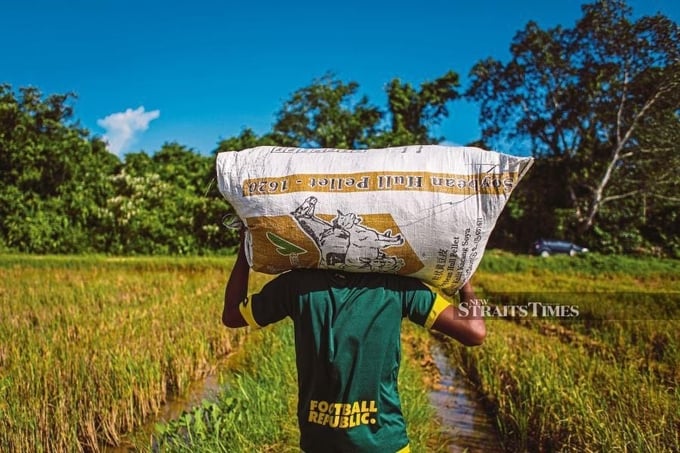June 22, 2025 | 22:13 GMT +7
June 22, 2025 | 22:13 GMT +7
Hotline: 0913.378.918
June 22, 2025 | 22:13 GMT +7
Hotline: 0913.378.918

A farmer carrying a sack of crop trimmings to be fed to livestock in Pokok Sena, Kedah, recently. Photo: LUQMAN HAKIM ZUBIR
Experts said the falling water reserves in the northern part of Peninsular Malaysia have shown the "broader impact" of climate change.
Malaysia's National Disaster Management Agency said that as of Aug 5, raw water reserves at the Muda Dam in Kedah, the Bukit Merah Dam in Perak and the Teluk Bahang Dam in Penang have dropped to a "dangerous level" of 7.44 percent, 16.43 percent and 28.20 percent, respectively.
Likewise, water reserves in five other dams in the states of Kedah, Penang and Perlis have reached a warning level of less than 59.99 percent.
Serina Abdul Rahman, a lecturer at the Department of Southeast Asian Studies at the National University of Singapore, said that while Malaysia goes through cycles of drought and flooding every year, this seasonal occurrence is happening more severely and frequently.
"Climate change has made extreme weather phenomena more frequent and this ranges from high temperatures to more severe storms," Serina said.
Extreme heat for prolonged periods, coupled with lack of rain, dries out the dams and reduces water availability, she said.
Mohamad Faiz Mohd Amin, an associate professor of earth science at the Universiti Malaysia Kelantan, said the current drought in Northern Malaysia is "a stark indication of the broader impacts of climate change".
Mohamad Faiz, who is also an invited researcher at the Water Resources Research Center at Kyoto University in Japan, said data showed that average temperatures have increased and rainfall patterns have become erratic in the past few years. These factors have reduced reservoir water availability, he said.
He cited Kedah and Perlis, which are experiencing one of the driest periods in decades.
The low water reserves have dried up the paddy fields of Kedah and could potentially slash rice production by as much as 40 percent, he said. This could lead to higher food prices and a shortage of the national staple as Kedah is the country's rice bowl.
Reduced water levels are increasing the concentrations of pollutants and cutting oxygen levels, he said, which can kill fish populations and lead to a decline in biodiversity.
The effect could be felt beyond the food and agricultural sector. Other water-intensive industries may face production cuts and the tourism industry could suffer as natural attractions such as rivers and lakes dry up, Mohamad Faiz said.
The Malaysian Institute of Economic Research has estimated that water shortages could result in a 0.5 percent reduction in GDP growth, he said.
Health issues
Water rationing is being implemented in many areas and residents are experiencing intermittent water supply, which disrupts daily activities and increases the risk of waterborne diseases and other health issues, he said.
Citing data from the Malaysian Health Ministry, Mohamad Faiz said the incidence of waterborne diseases rises by 15 percent during prolonged dry periods as the dry spell usually compromises water quality.
Serina from the National University of Singapore said water shortage "makes life very difficult for citizens no matter where they are".
"The water shortages could happen anywhere, and people need to be more careful with water usage," she said.
Mohamad Faiz said the situation stresses the urgent need for national climate adaptation strategies.
There is a need for comprehensive policies on water management, infrastructure resilience and community preparedness, as well as investment in climate-resilient infrastructure and sustainable practices for long-term adaptation, he said.
(CND)

(VAN) Poultry production in Poland, which has only started recovering from devastating bird flu outbreaks earlier this year, has been hit by a series of outbreaks of Newcastle disease, with the veterinary situation deteriorating rapidly.

(VAN) Extensive licensing requirements raise concerns about intellectual property theft.

(VAN) As of Friday, a salmonella outbreak linked to a California egg producer had sickened at least 79 people. Of the infected people, 21 hospitalizations were reported, U.S. health officials said.

(VAN) With the war ongoing, many Ukrainian farmers and rural farming families face limited access to their land due to mines and lack the financial resources to purchase needed agricultural inputs.

(VAN) Vikas Rambal has quietly built a $5 billion business empire in manufacturing, property and solar, and catapulted onto the Rich List.

(VAN) Available cropland now at less than five percent, according to latest geospatial assessment from FAO and UNOSAT.

(VAN) Alt Carbon has raised $12 million in a seed round as it plans to scale its carbon dioxide removal work in the South Asian nation.